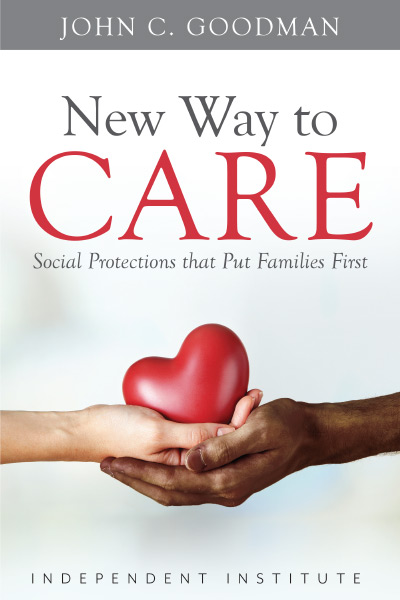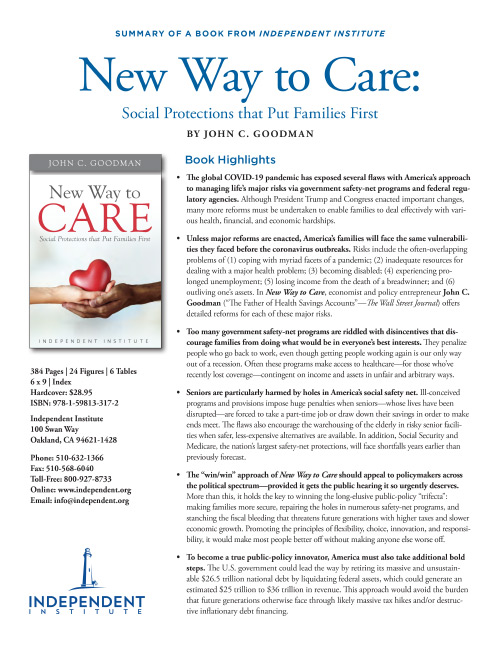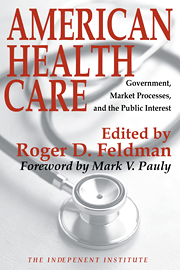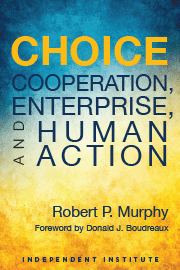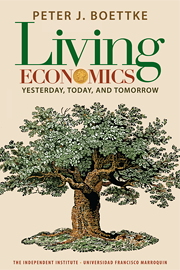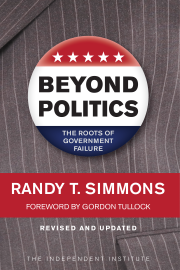| List Price: | ||
| Price: | $24.61 | |
| Discount: | $4.34 (Save 15%) |
| List Price: | ||
| Price: | $24.61 | |
| Discount: | $4.34 (Save 15%) |
Overview
The COVID-19 pandemic. Obamacare. The Great Recession. The dot-com bust. The early ’90s recession. Every decade or so a disaster hits the United States and reminds us that many American families live one calamity away from financial ruin.
But what if there were a better way to help families protect themselves from life’s risks? And what if that way did not require bloated government bureaucracies, increased taxes, and runaway spending and debt?
Fortunately, author, economist, policy entrepreneur, and Independent Institute Senior Fellow John C. Goodman, Ph.D., has forged just such a path.
In New Way to Care: Social Protections That Put Families First, Dr. Goodman offers a bold but practical strategy for giving Americans more control and security over their own finances and destiny, while still promoting—at far less expense—the vital social goals that gave rise to well-intended but failing government safety-net programs.
Here are just a few of the life-risks to which Dr. Goodman—the “Father of Health Savings Accounts,” according to the Wall Street Journal—presents solutions:
- Growing too old and outliving one’s assets
- Dying too young and leaving dependent family members without resources
- Becoming disabled and facing financial catastrophe
- Suffering a major health event and being unable to afford needed medical care
- Becoming unemployed and finding no market for one’s skills.
In New Way to Care, Dr. Goodman invites us to envision smartly crafted social protections that better empower and serve the nation’s families, harmonize individual and societal interests, foster personal responsibility and government accountability, bridge the partisan divide over social spending—and eliminate the risk that America’s safety-net expenditures will drive the U.S. economy over a fiscal cliff. The debate in America over social insurance will never be the same.
Contents
Introduction: A New Approach to Public Policy
Section 1: A Better Way to Manage Life’s Risks
- The Case for Change
- Balancing Individual and Societal Interests
- Alternatives That Offer Individual Choice
- Choice, Ownership, Responsibility
Section 2: Taking a Closer Look at the Risks
- The Risk of Growing Too Old and Outliving One’s Assets
- The Risk of Dying Too Young and Leaving Dependent Family Members without Resources
- The Risk of Becoming Disabled and Facing Financial Ruin
- The Risk of Facing a Major Health Event and
Being Unable to Afford Needed Medical Care
- The Risk of Becoming Unemployed and Finding No Market for One’s Skills
- The Risk of Plagues, Pandemics, and Other Threats to Public Health
Section 3: Taking a Closer Look at Some Solutions
- Addressing the Risks of Old Age
- Opting Out of Social Security Survivor Insurance
- Opting Out of Social Security Disability Insurance
- Addressing the Risk of Ill Health
- Opting Out of Unemployment Insurance
- Combatting the Coronavirus
Conclusion: Life under a Reformed System
Appendix 1: Ten Things You Need to Know about Medicare for All
Appendix 2: What Socialized Medicine Looks Like
Bibliography
Notes
About the Author
Detailed Summary
- The global COVID-19 pandemic has exposed several flaws with America’s approach to managing life’s major risks via government safety-net programs and federal regulatory agencies. Although President Trump and Congress enacted important changes, many more reforms must be undertaken to enable families to deal effectively with various health, financial, and economic hardships.
- Unless major reforms are enacted, America’s families will face the same vulnerabilities they faced before the coronavirus outbreaks. Risks include the often-overlapping problems of (1) coping with myriad facets of a pandemic; (2) inadequate resources for dealing with a major health problem; (3) becoming disabled; (4) experiencing prolonged unemployment; (5) losing income from the death of a breadwinner; and (6) outliving one’s assets. In New Way to Care, economist and policy entrepreneur John C. Goodman (“The Father of Health Savings Accounts”—The Wall Street Journal) offers detailed reforms for each of these major risks.
- Too many government safety-net programs are riddled with disincentives that discourage families from doing what would be in everyone’s best interests. They penalize people who go back to work, even though getting people working again is our only way out of a recession. Often these programs make access to healthcare—for those who’ve recently lost coverage—contingent on income and assets in unfair and arbitrary ways.
- Seniors are particularly harmed by holes in America’s social safety net. Ill-conceived programs and provisions impose huge penalties when seniors—whose lives have been disrupted—are forced to take a part-time job or draw down their savings in order to make ends meet. The flaws also encourage the warehousing of the elderly in risky senior facilities when safer, less-expensive alternatives are available. In addition, Social Security and Medicare, the nation’s largest safety-net protections, will face shortfalls years earlier than previously forecast.
- The “win/win” approach of New Way to Care should appeal to policymakers across the political spectrum—provided it gets the public hearing it so urgently deserves. More than this, it holds the key to winning the long-elusive public-policy “trifecta”: making families more secure, repairing the holes in numerous safety-net programs, and stanching the fiscal bleeding that threatens future generations with higher taxes and slower economic growth. Promoting the principles of flexibility, choice, innovation, and responsibility, it would make most people better off without making anyone else worse off.
- To become a true public-policy innovator, America must also take additional bold steps. The U.S. government could lead the way by retiring its massive and unsustainable $26.5 trillion national debt by liquidating federal assets, which could generate an estimated $25 trillion to $36 trillion in revenue. This approach would avoid the burden that future generations otherwise face through likely massive tax hikes and/or destructive inflationary debt financing.
The COVID-19 pandemic. The Great Recession. The dot-com bust. The early ’90s recession. Every decade or so a disaster hits the United States and reminds us that the vast majority of American families are financially unprepared for an economic calamity. Even in good years, too few people save enough money for unexpected medical bills, for periods of unanticipated loss of income, and for a comfortable retirement. Nor are federal, state, and local safety nets up to the task. At all levels, government has made promises that American taxpayers seem either unable or unwilling to fund.
But what if there were a better way to help families protect themselves from life’s risks? And what if it also allowed families to avoid relying on rigid, budget-busting government bureaucracies?
Fortunately, author and Independent Institute Senior Fellow John C. Goodman, Ph.D.—the economist and policy entrepreneur the Wall Street Journal calls the “Father of Health Savings Accounts”—has forged just such a path.
In New Way to Care: Social Protections That Put Families First, Goodman offers a bold strategy for giving Americans more control over their destiny while still promoting the important social goals that gave rise to government safety-net programs in the first place. This strategy would not only give families more options for dealing with life’s risks, but it would also reduce the risk of future tax hikes to fund an inefficient, ineffective, and often counterproductive government safety net.
Goodman applies his win-win strategy to the design of real solutions for the leading risks of modern life: growing too old and outliving one’s assets; dying too young and leaving dependent family members without resources; becoming disabled and facing financial ruin; suffering a major health event and being unable to afford needed medical care; and becoming unemployed and finding no market for one’s skills. In doing so, he creates a blueprint for positive change that can appeal to voters and policymakers across the partisan divide.
With the publication of New Way to Care, Goodman invites readers to envision a future in which smartly crafted social protections better serve families, harmonize individual and societal interests, foster personal responsibility and government accountability, bridge the partisan divide over social spending, and eliminate the risk that America’s safety-net expenditures will drive the economy over a fiscal cliff.
A Better Way to Manage Life’s Risks
The key to Goodman’s win-win strategy is to identify and eliminate the inefficiencies that plague so many government programs (the list of which is practically endless) and to dismantle the roadblocks that prevent ordinary families from accessing the kinds of financial products that would deliver real economic security. Before we can create a flexible genuine safety net, however, we must first understand the initial reasons for government involvement.
The underlying rationale, Goodman explains, is that individuals can suffer problems that end up imposing costs on others. Whether caused by misfortune or mismanagement, undesirable events can lead individuals to become a “free rider” on the generosity of their families, neighbors, and community. Social insurance, the thinking goes, minimizes this burden.
Unfortunately, precisely because social insurance is unlike traditional indemnity insurance, it is prone to various problems. It’s insulated from private-sector competition. It’s almost always more expensive than necessary. It ignores differences in individual needs. And it almost always leaves individuals with perverse incentives. Rather than funded by existing resources, social insurance is almost always operated on a pay-as-you-go basis, with no money saved for the future.
A better strategy would be financially sound. It would learn from the principle of trial-and-error as markets routinely do. It would also leverage individual choice. And it would be applicable to all of the risks of modern life that social insurance is meant to address.
Life’s Risks—and How They’re Mismanaged
For most of human history, the family has been the main protection against life’s major risks. In the modern world, that role has been largely assumed by government social insurance, but poorly designed policies have created new problems.
Plagues, Pandemics, and Public Health Threats. The public health movement arose to curb easily spread infections, which economists justified for reducing “negative externalities” (a concept that early 20th century Progressives used to justify forced sterilization). The movement also birthed regulatory agencies that enacted barriers that hindered a more entrepreneurial approach to health care, such as restrictions that harmed efforts to combat outbreaks of the novel coronavirus.
Growing Too Old and Outliving One’s Assets. Because Social Security and Medicare benefits for baby boomers are unfunded, the huge cash-flow deficit grows larger with each passing day. These programs (along with Medicaid, the largest provider of long-term coverage) are inflexible and create perverse incentives. A better safety net would, for example, allow seniors to convert any benefits to help them pay for assisted living. It would also avoid creating a cottage industry to help seniors shelter their assets so they can qualify for Medicaid’s long-term care program.
Dying Too Young and Leaving Dependents without Resources. Social Security Survivors’ Benefits program has the same flaws as many other government insurance plans: premiums are unrelated to risks, benefits are unrelated to needs, there are no viable alternatives for those who rely on it, and it can disincentivize working. A surviving spouse (usually a woman) faces penalties for earning wages: $1 of benefits is lost for every $2 earned above $17,640 (the threshold for 2019). And if the widow is in the 10 percent income tax bracket, she faces a total marginal tax rate of 75 percent on earnings, not counting state and local income taxes.
Becoming Disabled and Facing Financial Ruin. Due to design flaws, inefficiencies and perverse incentives plague the federal and state systems dealing with workers unable to work due to sickness or injury. This explains why disability claims have soared in recent decades for Social Security Disability Insurance (SSDI), Supplemental Security Income (SSI), disability benefits for veterans, and state-based Worker’s Compensation.
Being Unable to Afford Needed Medical Care for Major Health Event. The Patient Protection and Affordable Care Act (a.k.a. Obamacare) has succeeded in insuring additional people, but its side-effects are significant. It encourages public insurance over private insurance. It tries to force employers to provide more nonportable insurance. It restricts the availability of self-insurance. And it creates even more perverse incentives in the market for health insurance. The number of people who buy individual insurance and don’t receive an Obamacare subsidy has dropped substantially, putting pressure on premiums to rise for those who continue to purchase unsubsidized coverage in the individual market.
Becoming Unemployed and Finding No Market for One’s Skills. The federal government created the unemployment insurance system in 1935 to pay benefits to laid-off workers. States administer the system by collecting their own payroll taxes, maintaining a trust fund, and disbursing cash benefits to the unemployment. The federal government collects an additional tax from employers and loans money to states if their trust fund runs low. Benefits to low-wage workers are typically 50 to 70 percent of their previous wages, lasting usually for 26 weeks. Unfortunately, unemployment insurance has encouraged layoffs, discouraged job search, increased long-term unemployment, and treated workers unfairly.
Social Protections That Put Families First
Fortunately, adopting Goodman’s win-win approach can improve not just individual government programs, but also entire social insurance systems.
Combatting the Coronavirus. Although critics have characterized the Trump administration’s response to the outbreaks as disorganized and slapdash, many executive actions taken in early 2020 reflected a new approach to health policy, such as promoting telemedicine, enabling chronically ill patients to have access to free diagnoses and treatments without losing access to Health Savings Accounts, and encouraging employers to provide workers with individually owned policies. Goodman notes have far we’ve come, and how much further we need to go, such as by making emergency health reforms permanent.
Addressing the Risks of Old Age. To eliminate its long-run unfunded liabilities without cutting benefits, the Social Security system would require an immediate and permanent payroll tax hike of 3.6 percentage points. To avoid the need for such a tax hike, Goodman proposes allowing employees to drop out of the program and fund their own retirement by saving and investing 4 percent of their wages throughout their working lives. At retirement, a worker’s account balance would be used to buy an inflation-protected lifetime annuity providing monthly income. The government would guarantee each retiree a pension income no less than what Social Security would have promised.
Opting Out of Survivor Insurance. Family dependents can be left financially devastated after the death of the household’s breadwinner. Unfortunately, Social Security Survivor Insurance has problems that impair dealing with the risk. One alternative is to pre-fund survivor insurance with a small percentage of workers’ accounts (about 1 percent) for the purchase of group life insurance through a pension fund provider. Workers could be allowed to opt out of the purchase requirement once their pension account balances can cover 70 percent of their wages at retirement. As with many social protections, Chile’s system offers positive lessons.
Opting Out of Disability Insurance. The leading federal disability program serves families poorly, especially with its rigid work prohibitions. Moving to a private system of disability insurance is relatively simple. Many firms already offer free or low-priced short-term disability coverage (six months or less), and many workers have the option of purchasing employer-provided long-term disability plans at a reasonable price. A personal account system would be similar (costing about 1 percent of payroll), offering more flexibility whether or not it allowed opting out. Texas offers positive lessons for making state workers’ compensations more flexible and efficient.
Addressing the Risk of Ill Health. Health policy in general and Obamacare in particular offer numerous opportunities for win-win changes. The insurance exchanges could be turned into real markets, without artificial prices, without government risk adjustment, without limited enrollment periods, and without the perverse incentives to underserve the chronically ill patient pool. It’s even possible to ensure real protections for individuals with pre-existing conditions.
Opting Out of Unemployment Insurance. If the United States were to enact a system of individual unemployment-insurance accounts, this change would eliminate the incentive for employers to lay off workers. And workers with unstable employment would no longer disproportionately bear the burden. Instead, they would demand a higher wage premium that makes up for the smaller account balances expected at retirement. The safety net for workers new to the labor force or frequently are unemployed could be funded by experience-adjusted tax rates. Workers would then have a strong incentive to find new jobs quickly, so that they will have more money in their accounts at retirement. Again, Chile offers valuable lessons.
As New Way to Care shows, families would have their needs better met if they were allowed to opt out of rigid, inefficient, and counterproductive government programs and to enroll in alternatives that offered greater choice and flexibility. The sign on the path to the promised land, however, need not say “Take It or Leave It.” Allowing individuals to opt out partially and progressively over time would reduce people’s concerns and make Goodman’s win-win strategy even more politically attractive.
Praise
“John Goodman is a national treasure whose New Way to Care: Social Protections That Put Families First should be national policy. It is pragmatic, knowledgeable, and accessible. Read it and help to accomplish John’s wise advice.”
—Regina E. Herzlinger, Nancy R. McPherson Professor of Business Administration, Harvard Business School
“John Goodman is an extraordinarily deep, knowledgeable, and original architect of American domestic policy. His book New Way to Care provides a compelling path out of our terrible social insurance policy morass. It is a must read for anyone truly seeking to make America great again.”
—Laurence J. Kotlikoff, William Fairfield Warren Distinguished Professor and Professor of Economics, Boston University
“Long one of the nation’s leading health policy experts, Goodman has a history of proposing the next big thing in market-based reforms. New Way to Care takes readers on a tour of federal entitlement programs in search for win-win policy changes that can leave everyone better off. Anyone alarmed that the safety net will not remain safe can find cause for hope here.”
—Mitchel E. Daniels, Jr., President, Purdue University; former Governor of Indiana; former Director, U.S. Office of Management and Budget; Co-Chair, Committee for a Responsible Federal Budget
“No one has worked longer and more effectively at creating a modern, people-oriented and affordable health system than John Goodman. He is an amazing pioneer and his book New Way to Care reflects his knowledge and his insights. In the book, he shows what’s wrong with our antiquated system of social insurance. Other countries, he writes, have found better solutions that merit our attention.”
—Newt Gingrich, former Majority Leader, U.S. House of Representatives
“John Goodman is someone everyone should listen to when it comes to healthcare policy—with his book New Way to Care, the same can now be said for social insurance. While many misdiagnose the problems with our healthcare and social insurance systems, Goodman correctly identifies one of the most serious problems—inefficient regulations. While others propose more regulation to cure the ills caused by past regulations, Goodman proposes the types of market-based reforms that can make our social insurance system function better.”
—Kevin M. Murphy, George J. Stigler Distinguished Service Professor of Economics, University of Chicago; Member, American Academy of Arts and Sciences; MacArthur Fellow
“John Goodman is one of the most creative thinkers of our time in the complex world of health care policy. In his book New Way to Care, he puts forth important, thought-provoking ideas about the role of government in the personal lives of Americans. Read it!”
—Scott W. Atlas, M.D., Robert Wesson Senior Fellow, Hoover Institution; former Member, White House Coronavirus Task Force
“In New Way to Care, John Goodman is consistently ahead of his time with market solutions which align incentives that respect the agency of individuals while ensuring there is a social safety net. What he writes today will be policy in the coming years.”
—Bill Cassidy, M.D., U. S. Senator
“In his book New Way to Care, John Goodman again demonstrates the creativity that led to his invention of ‘Health Savings Accounts.’ John shows that the major risks of life—health, premature death, outliving one’s assets, disability, unemployment—are made worse by inefficient government policies. John shows in detail how elimination of many government policies would enable people to use the private market to minimize these risks at a much lower cost. Under the right circumstances, this book could improve many areas of life in the same way that Health Savings Accounts have improved markets for health insurance.”
—Paul H. Rubin, Samuel Candler Dobbs Professor of Economics and Law, Emory University
“Whether the topic is the FDA, Medicare, the VA or telemedicine, John Goodman uses his characteristic clarity and vast storehouse of knowledge in the book New Way to Care to shed light on the arcane technicalities and perverse rules that stand between all American families and the healthcare that they need, deserve and can afford.”
—Richard A. Epstein, Laurence A. Tisch Professor of Law, New York University; Peter and Kirsten Bedford Senior Fellow, Hoover Institution; and James Parker Hall Distinguished Service Professor Emeritus of Law, University of Chicago
“For the last quarter century, John Goodman has been one of the nation’s best and most original thinkers on the economics of health care. The book New Way to Care is more of his good and original thinking about how we can improve both the efficiency of the health care system and the quality of care that it provides. I commend this book to you because it contains a whole new way of organizing the American health care system—something that is desperately needed.”
—W. Philip Gramm, former U.S. Senator; former Chairman, Senate Committee on Banking, Housing, and Urban Affairs; Senior Partner, US Policy Metrics; former Vice Chairman, UBS Investment Bank
“John C. Goodman’s book, New Way to Care, should be mandatory reading for every politician in Congress and state legislatures. It is an instruction manual to escape the morass of the current stifling bureaucratic government-controlled healthcare system designed by politicians focusing on votes. Goodman clearly explains how to build a patient-centric medical system where the patient has choice, control, and responsibility for their medical insurance and physicians. Highly recommended for everyone in the USA!”
—Donald J. Palmisano, M.D., J.D., FACS, former President, American Medical Association; Adjunct Professor of Surgery and Clinical Professor of Medical Jurisprudence, Tulane University School of Medicine
“In New Way to Care, economist John C. Goodman . . . reveals the disincentives, inefficiencies, hypocrisies, astronomical unfunded liabilities, and general absurdities in the programs that currently exist. Then he goes beyond that to lay out the policy alternatives that, he argues, would make the American social security, disability, and health care universe effective, consumer-centered, and, above all, pro-liberty. . . . No one has done more than Goodman to force the principles of patient choice and provider competition upon a health policy community that has been uncomfortably resistant at best and relentlessly opposed at worst. Goodman is widely credited as the father of health savings accounts, an idea that Congress enacted in 2003 and now benefits more than 25 million American families. In his new book, Goodman asks the pointed question: Why is government involved in retirement security, medical care, disability support, and unemployment payments? . . . Goodman focuses on how to deal with real risks that people face: outliving one’s assets, dying and leaving your family without resources, becoming disabled and facing financial ruin, becoming unemployed and finding no market for your skills, or surviving a pandemic. A two-word summary of his solutions would read: ‘opt out.’ Goodman wants people to be able to exit dysfunctional systems, both to improve their own circumstances and to give those systems an incentive to improve. More expansively, Goodman wants all of those programs if not totally scrapped then redesigned to maximize choice and responsibility in light of sound economic principles. . . . New Way to Care is enormously valuable for anyone engaged in the debates over the future of retirement, disability, unemployment, and health care policies. Life would be better for all Americans if John Goodman and other market-oriented health policy practitioners could achieve majority support.”
—Reason
“John Goodman has kept up a high standard of comment on social policy in America for several decades and New Way to Care is no exception.”
—David G. Green, Director, Civitas, United Kingdom
“In New Way to Care, once again John Goodman’s clear and down-to-earth writing style has provided a clear and convincing argument for increasing individual freedom as a way to increase the population’s well-being. This book covers a wide range of government infringements on the freedom of individuals to improve their wellbeing. Its discussion of the current COVID-19 pandemic is especially on point.”
—Thomas R. Saving, Director, Private Enterprise Research Center and University Distinguished Professor of Economics, Texas A&M University
“New Way to Care is a provocative book. Even those of us who don’t fully share John Goodman’s fundamental world view should carefully consider many of his arguments for making social programs more efficient.”
—Susan Dentzer, Senior Policy Fellow, Robert J. Margolis Center for Health Policy, Duke University; former Editor-in-Chief, Health Affairs
“The COVID-19 pandemic. The Great Recession. The dot-com bust. The early ‘90s recession. Every decade or so a disaster hits the United States and reminds us that many American families live one calamity away from financial ruin. But what if there were a better way to help families protect themselves from life’s risks? And what if that way did not further bloat large government bureaucracies and inflate even more their obscene budgets? Fortunately, author, economist, policy entrepreneur, and Independent Institute Senior Fellow John C. Goodman, Ph.D., has forged just such a path in his new book, New Way to Care: Social Protections That Put Families First. In this timely study Goodman offers a bold strategy for giving Americans more control over their destiny, while still promoting (at far less expense) the important social goals that gave rise to government safety-net programs in the first place. New Way to Care presents effective solutions to: Growing too old and outliving one’s assets; Dying too young and leaving dependent family members without resources; Becoming disabled and facing financial catastrophe; Suffering a major health event and being unable to afford needed medical care; Becoming unemployed and finding no market for one’s skills. In New Way to Care, Goodman also invites us to envision smartly crafted social protections that better serve the nation's families—and eliminate the risk that America’s safety-net expenditures will drive the U.S. economy over a fiscal cliff. Erudite, eloquent, and thoroughly ‘reader friendly’ in commentary, organization and presentation, New Way to Care: Social Protections That Put Families First is an invaluable and timely contribution to our on-going national discussion on how to equitably and effectively resolve the deleterious economic impact that the COVID-19 driven hardships have imposed on individuals and families in these especially troubled and political divisive times. A very highly recommended addition to community, college, and university library Contemporary Economics and Social Services/Welfare collections and supplemental curriculum studies reading lists, it should be noted for students, academicians, economists, governmental policy makers, and political activists.”
—Midwest Book Review
“In the innovative book New Way to Care, John Goodman takes the reader on a tour through the labyrinth of government-run social insurance programs—Social Security, Medicare, and other programs that are supposed to help those who are most in need. The book explains how even the most sophisticated individual can be caught up in contradictory program rules that can mean the devastating loss of benefits. Goodman argues that instead of uprooting the whole system, let Americans decide how much they want to rely on the government or on their own actions through the private sector to meet their families’ needs. That’s a reform we can live with.”
—Joseph R. Antos, Wilson H. Taylor Scholar in Health Care and Retirement Policy, American Enterprise Institute
“In his book New Way to Care, John Goodman, rightly credited with conceiving of the health savings account, presents a series of practical suggestions to improve American social insurance programs such as Medicare and Social Security. His combination of analysis and proposals can help citizens understand the flaws in the current systems and help guide lawmakers who are serious about improving them.”
—Howard A. Husock, Senior Fellow and Director, Tocqueville Project, Manhattan Institute; author, Who Killed Civil Society? The Rise of Big Government and Decline of Bourgeois Norms
“In New Way to Care, John Goodman holds a mirror up to our emerging reality under government-designed and regulated social-protection programs. What we clearly see is an unsustainable economic reality, coupled with benefit delivery that falls short for everyone. He also reminds us of the power of individuality and creativity, suggesting that everyone would do better if we put families first, and let them secure their own futures. Unlike the current communications style, Goodman offers a fact-based, calm and respectful approach to negotiating the path to a better future.”
—Stephen B. Bonner, former President and CEO, Cancer Treatment Centers of America
“John C. Goodman’s New Way to Care: Social Protections That Put Families is an essential guide to the shortcomings of politicized social insurance in the U.S., including the government's failure to deal with the COVID-19 crisis. Goodman gives Americans a path forward that will empower individuals. Drawing on careful research, and backed by compelling analysis, Goodman discusses lessons to be learned from such diverse real-world alternatives as Medi-Share, an innovative private cooperative health-care haring plan, and Chile’s tremendously successful private retirement plans which have brought ordinary people higher returns than were ever possible under the governmental system. Goodman has written a first-rate book that both reveals the flaws of the status quo and points the way to a better future.”
—David T. Beito, Professor of History, University of Alabama; author, From Mutual Aid to the Welfare State: Fraternal Societies and Social Services, 1890-1967; co-editor, The Voluntary City: Choice, Community and Civil Society
“In New Way to Care, John Goodman has once again written a very readable and timely book on how Americans can have access to inexpensive, flexible and quality healthcare, employment, retirement and other vital needs. In doing so, he shows there are strategies to rein in entitlement spending and respond to the debt crisis that rely on private, market-based strategies. Anyone interested in finding private-sector ways that are responsive to these vital issues while still creating a family-oriented future should read New Way to Care.”
—Gail R. Wilensky, Senior Fellow, Center for Health Affairs, Project HOPE; former Deputy Assistant to President for Policy Development; first Chair, Medicare Payment Advisory Commission; former President, Defense Health Board; former Commissioner, World Health Organization’s Commission on the Social Determinants of Health
“New Way to Care examines the inefficiencies and disincentives resulting from government regulation of public programs, promoting new policies that would give individuals more choice and control over their lives and resources while still providing a social safety net. Outlines the underlying historical and social causes of governments’ inability to sufficiently provide social benefits. Explains that the goal of social insurance programs should be to maximize choice and opportunity for individuals. Highlights national and international examples of social policy changes under which both taxpayers and beneficiaries come out ahead. Addresses policy reforms that honor individual choice and at the same time support goals that underlie social insurance. Summarizes the problems of Social Security and Medicare. Discusses the risk of dying too young and leaving dependent family members without resources. Describes the financial risk of becoming disabled and the subpar safety net systems that disabled workers encounter. Reviews problems with the US health-care market and why it does not work as well as other consumer markets. Details the risk of becoming unemployed and the harmful behavior encouraged by the US unemployment insurance system. Looks at how the risk of public health threats is exacerbated by the structure of the US government. Assesses how entitlement programs for the elderly can be fundamentally reformed in ways that simultaneously better meet beneficiaries’ needs and reduce taxpayer burden. Explores the Chilean system of survivors’ benefits for deceased workers’ dependents. Covers examples of, and opportunities for, reforms and alternatives to the US worker compensation system. Considers mistakes the United States has been making in terms of health policy and how to reform the Affordable Care Act. Discusses lessons for reform from the Chilean unemployment insurance system. Presents the argument that the COVID-19 pandemic enabled the Trump administration to take a free market approach to health policy.”
—Journal of Economic Literature
Awards
2021 Next Generation Indie Book Awards
- Finalist in General Non-Fiction
2021 Independent Publisher Book Awards (“IPPY” Awards)
- Silver Medal Winner in Finance/Investment/Economics
2021 American Book Fest “Best Book” Awards
- Winner in Best Cover Design: Nonfiction
- Finalist in Health: General
- Finalist in Nonfiction: General
- Finalist in Anthologies: Nonfiction
2021 International Book Awards (American Book Fest)
- Winner in Best Cover Design: Nonfiction
- Finalist in Health: General
- Finalist in Nonfiction: General

